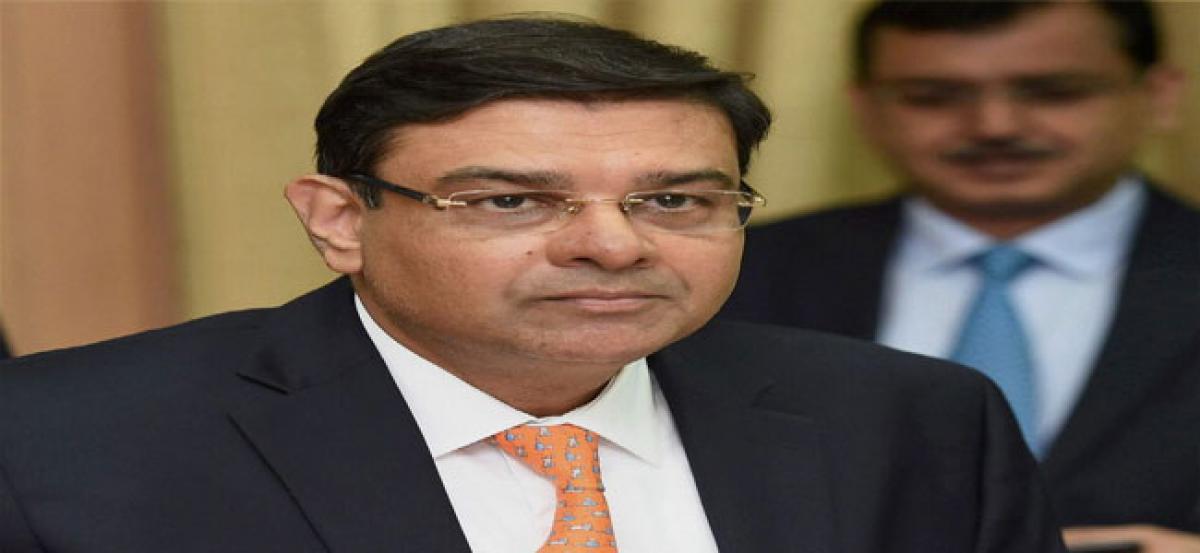Live
- Karthika Vanabhojanam at Tirumala on Nov 17
- Vikarabad Court Sends 16 Accused in Collector Attack Case to 14-Day Judicial Remand
- Hold awareness campaigns on solar energy across villages, officials told
- Door-to-door cancer screening tests to begin tomorrow
- Indigenous development of silicon carbide wafers, GaN HEMT
- AP Assembly Budget Sessions: Govt. to introduce three amendment bills today
- Police conduct sensitisation drive against drugs
- SWAT team to handle agitations, emergency situations
- Ban on single-use plastic from Jan 1
- Public opinion should be respected: BJP MP Aruna
Just In

Why individual members changed their minds from June, I think the resolution itself on balance, very comfortably shows why we went for a 25 bps cut.
Government, RBI are working closely to resolve large stressed assets, says Patel
Mumbai: RBI Governor Urjit Patel on Wednesday said inflation is expected to rise from record lows even as the central bank opted for a cut in key lending rate to a 6.5-year low "to reinvigorate private investment" and resolve the issue of mounting bad loans amid weak corporate balance sheets.
The 0.25 per cent lowering of the repo rate to 6 per cent comes after a 10-month pause and is the second since Patel took over last September. Patel had last cut the key rate by 0.25 per cent in his first policy review last October, which also was the first decided by a Monetary Policy Committee (MPC).
"Recognising that inflation is expected to rise from the current lows (1.54 per cent in June) over the rest of the year, the MPC persevered with the neutral stance," Patel told reporters at the customary post-policy presser here.
"Government and RBI are working in close coordination to resolve large stressed corporate borrowers and recapitalise PSBs within the fiscal deficit target," he added. Eventually, he said, these efforts should help restart credit flows to the productive sectors once demand revives.
On divergences in the policy document and action as also in the divergent views of the MPC members, Patel said: "The MPC decision is consistent with the June neutral stance in consonance with the objective of achieving the medium-term target for consumer price index inflation of 4 per cent within a band of +/- 2 per cent, while supporting growth.
"Why individual members changed their minds from June, I think the resolution itself on balance, very comfortably shows why we went for a 25 bps cut. Compared to the status quo in June, we had more datapoints, some uncertainty (on Central HRA impact and smooth GST rollout) has been resolved and there has been a substantial reduction in inflation, excluding food and fuel." RBI Deputy governor Viral B Acharya chipped in saying that addressing the twin balance sheets problem remains the RBI's top priority at the moment as this will help reinvigorate private investments.
He said: "Investment slowdown in our assessment is significantly rooted in the resulting debt overhang for this twin balance sheet issues. With the NPA clean-up currently underway, we are striving to meet in near future an important pre-requisite for effective transmission of the monetary policy, namely robust health of balance sheets in the financial and real sectors."
Stating that one of the biggest uncertainties has been resolved with the smooth GST rollout and central HRA payout, Patel said including this the projection still brings us close to 4 per cent inflation and since this is a statistical exercise it is right time for us to net that out.
He added: "I think what we've done is that we have taken a calibrated policy decision based on out-turns and our projections and we feel a 25 bps cut while keeping the stance neutral is something that we should be doing at this juncture. We had two data points on inflation and encompassing all the developments since June -- normal monsoons, smooth GST rollout, inflation excluding food and fuel coming down -- we thought that this was an opportune time to do a 25 bps cut."
Deputy governor N S Vishwanathan said RBI is working on new steps to resolve the large NPA issue over and above the 12 names largest defaulters it had already identified for liquidation process.
Acharya said RBI will also release in the coming weeks the final guidelines for tripartite repo that will pave the way for a vibrant corporate bond borrowing and lending market, providing better liquidity and price discovery, reducing market cost of capital and allowing access to NBFCs to a greater number of borrowers.

© 2024 Hyderabad Media House Limited/The Hans India. All rights reserved. Powered by hocalwire.com







